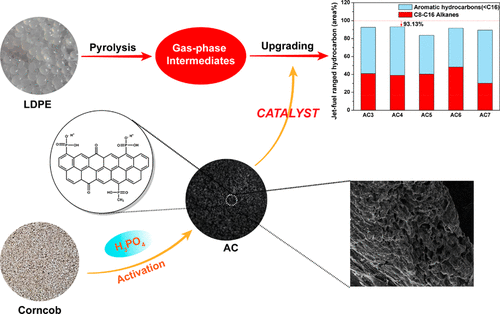当前位置:
X-MOL 学术
›
Ind. Eng. Chem. Res.
›
论文详情
Our official English website, www.x-mol.net, welcomes your feedback! (Note: you will need to create a separate account there.)
Tunable Production of Jet-Fuel Range Alkanes and Aromatics by Catalytic Pyrolysis of LDPE over Biomass-Derived Activated Carbons
Industrial & Engineering Chemistry Research ( IF 4.2 ) Pub Date : 2020-07-08 , DOI: 10.1021/acs.iecr.0c02482 Kun Wan 1 , Huan Chen 1 , Fangjuan Zheng 1 , Yankai Pan 1 , Yayun Zhang 1 , Donghui Long 1, 2
Industrial & Engineering Chemistry Research ( IF 4.2 ) Pub Date : 2020-07-08 , DOI: 10.1021/acs.iecr.0c02482 Kun Wan 1 , Huan Chen 1 , Fangjuan Zheng 1 , Yankai Pan 1 , Yayun Zhang 1 , Donghui Long 1, 2
Affiliation

|
Turning waste plastics (WPs) into valuable fuels and chemicals by catalytic pyrolysis is a promising strategy for alleviating fast fossil oil consumption and white pollution, where activated carbon (AC) is an emerging efficient catalyst but is not yet well studied. Herein, the corncob-derived ACs were prepared differently and used to conduct catalytic pyrolysis of low-density polyethylene (LDPE) to obtain value-added jet fuels. The porosity and acidity of ACs obtained varied under different fabrication conditions. The maximum specific surface area and the acidity could reach up to 1454.73 m2/g and 0.44 mmol/g, respectively. The highest liquid yield was 75.3 wt % with 93.13 area % of jet fuel-ranged hydrocarbons by using the AC that was carbonized at 500 °C and phosphoric acid to corncob ratio of 0.8. In addition, the highest contents of alkanes and aromatics in liquid oil were 48.21 and 59.21 area % by using AC prepared at 400 and 600 °C with phosphoric acid to corncob ratio of 0.8, respectively. Results unveil the AC with strong acidity is beneficial to the generation of aromatics, while AC with weak acidity is favorable to the generation of alkanes. Besides, increasing the catalytic temperature and AC to LDPE ratio are contributed to converting alkanes into aromatics. Therefore, tunable production of jet-fuel range alkanes and aromatics can be achieved by using different ACs of various acidity and reaction temperatures. The results also present a superior yield of liquid oil obtained with AC catalysts to conditional zeolite catalysts, indicating potentially promising practical application. The present work may provide more information for guiding ACs used efficiently in catalytic pyrolysis of WPs into value-added jet fuels.
中文翻译:

LDPE在生物质衍生的活性炭上催化热解可调谐生产喷气级烷烃和芳烃
通过催化热解将废塑料(WPs)转化为有价值的燃料和化学品是减轻化石油快速消耗和白色污染的一种有前途的策略,其中活性炭(AC)是新兴的高效催化剂,但尚未得到充分研究。在此,以不同方式制备了玉米芯衍生的AC,并将其用于低密度聚乙烯(LDPE)的催化热解以获得增值的喷气燃料。所获得的AC的孔隙率和酸度在不同的制造条件下会有所不同。最大比表面积和酸度可达到1454.73 m 2/ g和0.44 mmol / g。通过使用在500℃下碳化且磷酸与玉米芯的比率为0.8的AC,最高的液体产率为75.3 wt%,具有93.13面积%的喷气燃料含量的烃。另外,通过使用分别在400和600℃下制备的AC,磷酸与玉米芯的比例为0.8,在液体油中烷烃和芳族化合物的最高含量分别为48.21和59.21面积%。结果表明,具有强酸性的AC有利于芳烃的生成,而具有弱酸性的AC则有利于烷烃的生成。此外,提高催化温度和AC / LDPE比例有助于将烷烃转化为芳烃。因此,通过使用具有不同酸度和反应温度的不同AC,可以实现喷气燃料范围的烷烃和芳烃的可调谐生产。结果还表明,用AC催化剂获得的液态油的收率要高于条件沸石催化剂,表明其潜在的实用应用前景。本工作可能会提供更多信息,以指导有效地将WP催化热解中使用的AC转化为增值喷气燃料。
更新日期:2020-07-08
中文翻译:

LDPE在生物质衍生的活性炭上催化热解可调谐生产喷气级烷烃和芳烃
通过催化热解将废塑料(WPs)转化为有价值的燃料和化学品是减轻化石油快速消耗和白色污染的一种有前途的策略,其中活性炭(AC)是新兴的高效催化剂,但尚未得到充分研究。在此,以不同方式制备了玉米芯衍生的AC,并将其用于低密度聚乙烯(LDPE)的催化热解以获得增值的喷气燃料。所获得的AC的孔隙率和酸度在不同的制造条件下会有所不同。最大比表面积和酸度可达到1454.73 m 2/ g和0.44 mmol / g。通过使用在500℃下碳化且磷酸与玉米芯的比率为0.8的AC,最高的液体产率为75.3 wt%,具有93.13面积%的喷气燃料含量的烃。另外,通过使用分别在400和600℃下制备的AC,磷酸与玉米芯的比例为0.8,在液体油中烷烃和芳族化合物的最高含量分别为48.21和59.21面积%。结果表明,具有强酸性的AC有利于芳烃的生成,而具有弱酸性的AC则有利于烷烃的生成。此外,提高催化温度和AC / LDPE比例有助于将烷烃转化为芳烃。因此,通过使用具有不同酸度和反应温度的不同AC,可以实现喷气燃料范围的烷烃和芳烃的可调谐生产。结果还表明,用AC催化剂获得的液态油的收率要高于条件沸石催化剂,表明其潜在的实用应用前景。本工作可能会提供更多信息,以指导有效地将WP催化热解中使用的AC转化为增值喷气燃料。


























 京公网安备 11010802027423号
京公网安备 11010802027423号